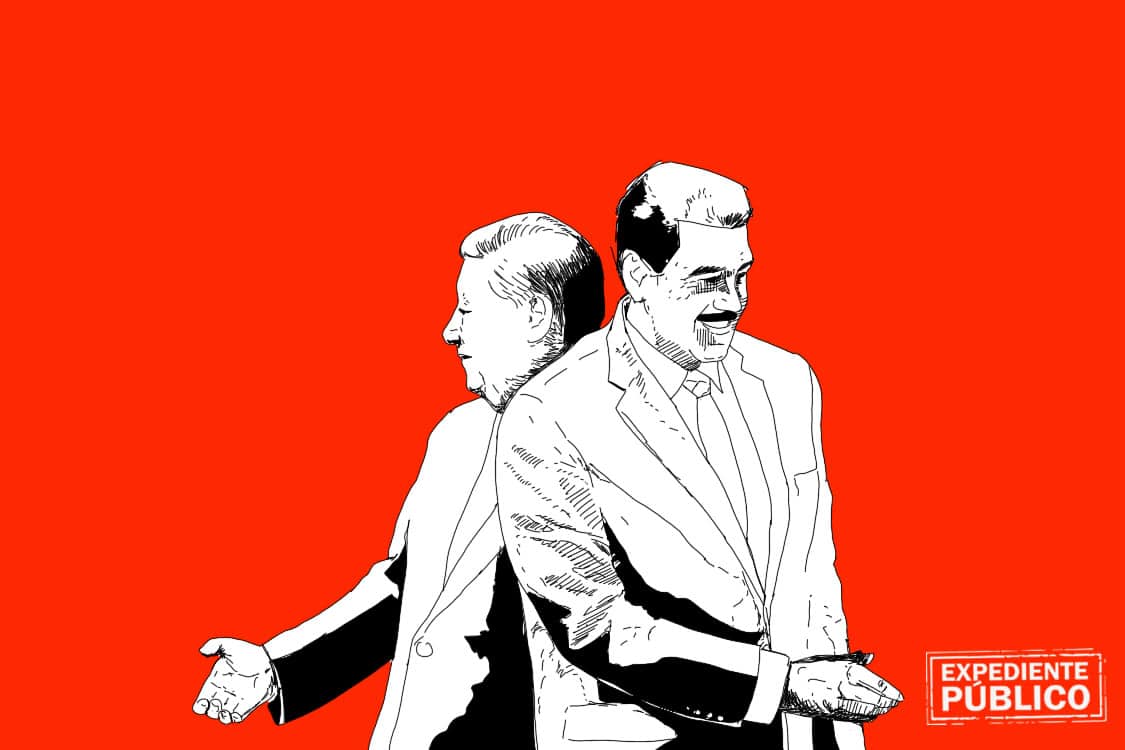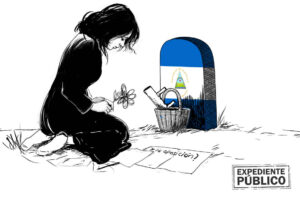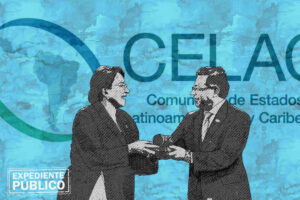*Beyond the signing of general agreements between Nicolás Maduro and China, and the promise of taking a Venezuelan to the moon, no concrete options were obtained to alleviate the serious crisis in Venezuela.
Expediente Público
After spending five days in China, Venezuelan President Nicolás Maduro returned to the Latin American country with a bag full of promises but without any concrete plan to address the pressing problems of the nation.
During the Venezuelan autocrat’s stay in the Asian nation, from September 8 to 14, 2023, his country was affected by recurring failures in the electrical service, which left even the most well-off sectors of Caracas in the dark.
Until recently, the capital of Venezuela seemed to be immune to the blackouts.
Simultaneously, long lines at gas stations have returned to Caracas and other large cities. There are long lines not only at gas stations that offer fuel at subsidized prices but also at those which operate at half a dollar per liter.
Most Venezuelans reject Nicolás Maduro
Maduro went to China with the hope of finding some solution to the fuel crisis, which is clearly not his only problem. Venezuela is in debt, and the regime has not been able to get back on its feet with less than 15 months to go before the presidential elections.
According to the most recent survey by Pronóstico, which the firm presented in August 2023, 84% of the population gives the Maduro administration a “poor” or “very poor” rating.
The Ministry of Foreign Affairs provided information that the regime used to justify Maduro’s stay in Beijing: the signing of 31 agreements in the areas of trade, the economy, tourism, education, health, technology, and civil aviation and aerospace engineering, as well as the mining, housing, electric power, and communications sectors.
Despite the statements of government propaganda, the Chinese remained cautious.
Regarding these agreements, the Venezuelan president highlighted the possibility of training “cosmonauts.”
“We are going to the moon,” he said.
Read: Nicolás Maduro copia las mismas tácticas de Daniel Ortega para perseguir a las ONG’s
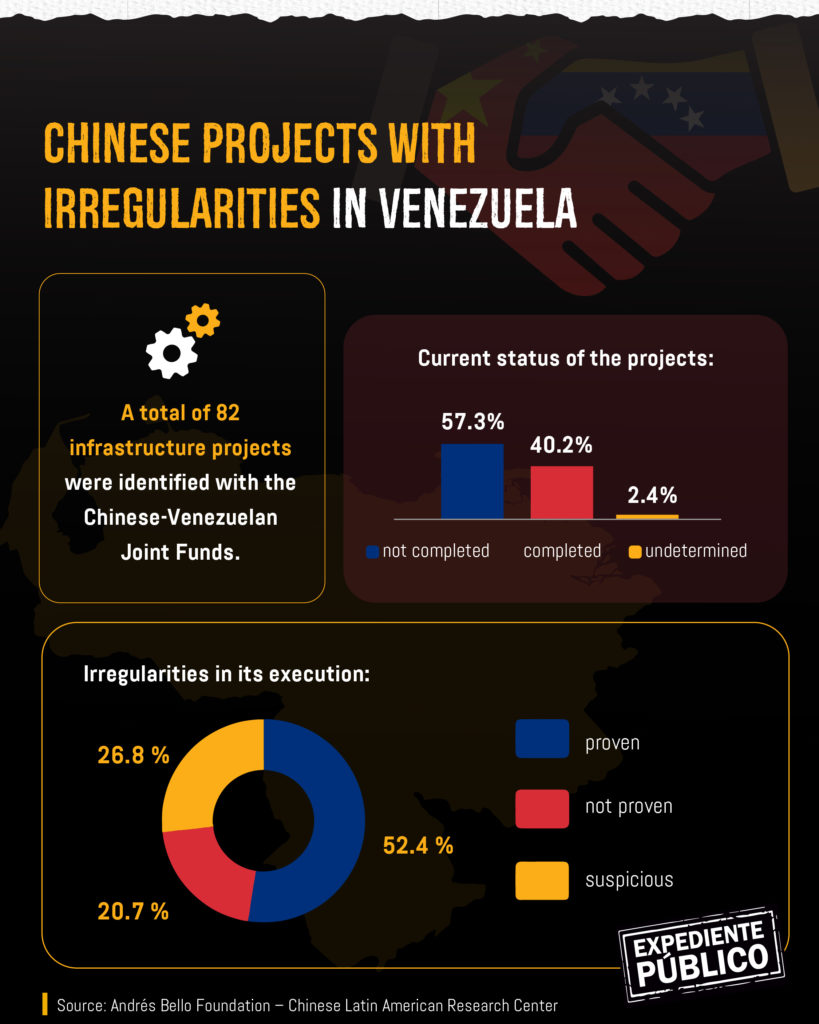
Debts and corruption
A report presented in April by the China-Latin American Center of Research at the Andrés Bello Foundation maintains that Venezuela became China’s most important debt creditor worldwide. Between 2005 and 2015, the Asian country loaned US$62 billion, or the equivalent of 45% of all the resources allocated to countries in the Latin American and Caribbean region.
“There was a good deal of cooperation, especially regarding trade and investment in oil and other extractive industries, such as gold,” explained the director of the Asia and Latin America Program at the Inter-American Dialogue, Margaret Myers.
The database published by the Andrés Bello Foundation shows the details of 16 allocations of resources to the Venezuelan government, 12 of them through the Chinese Economic Bank, three by EximBank, and the remaining one made jointly by the Chinese Development Bank and the Espírito Santo Bank of Portugal.
There were loans that constituted the different phases of the China-Venezuela Joint Funds, which aimed to finance development in the country and allocate recourses to mining projects in general, the Las Cristinas Gold Mine, the Port of Pequiven, working capital for the state-run oil company, and the acquisition of oil derivatives.
Interesting read: Índice de China revela los métodos de infiltración del gigante asiático en la sociedad
Some of these resources would be reimbursed by China through the delivery of crude oil from the Orinoco Oil Belt and cash payments. In 2015, the Chinese halted the flow of resources from China to Venezuela. Maduro tried to salvage this relationship three years later. In September 2018, the South American president returned to Beijing. Similar to what happened following Maduro’s most recent trip, former spokesmen for the Venezuelan regime assured the people that the trip resulted in “huge achievements,” when, in reality, Maduro returned to Venezuela empty-handed.
Xi Jinping’s interest in the country
China’s rapprochement with Venezuela began during the government of Hugo Chávez (2002-2013), in the form of bonds.
“Recently, there has been a real feeling in Beijing that it no longer makes sense to spend money on Venezuela, despite being its diplomatic partner. Venezuela is not a worthy recipient of continued financing or investment from China,” said the representative of the Inter-American Dialogue in an interview with Expediente Público.
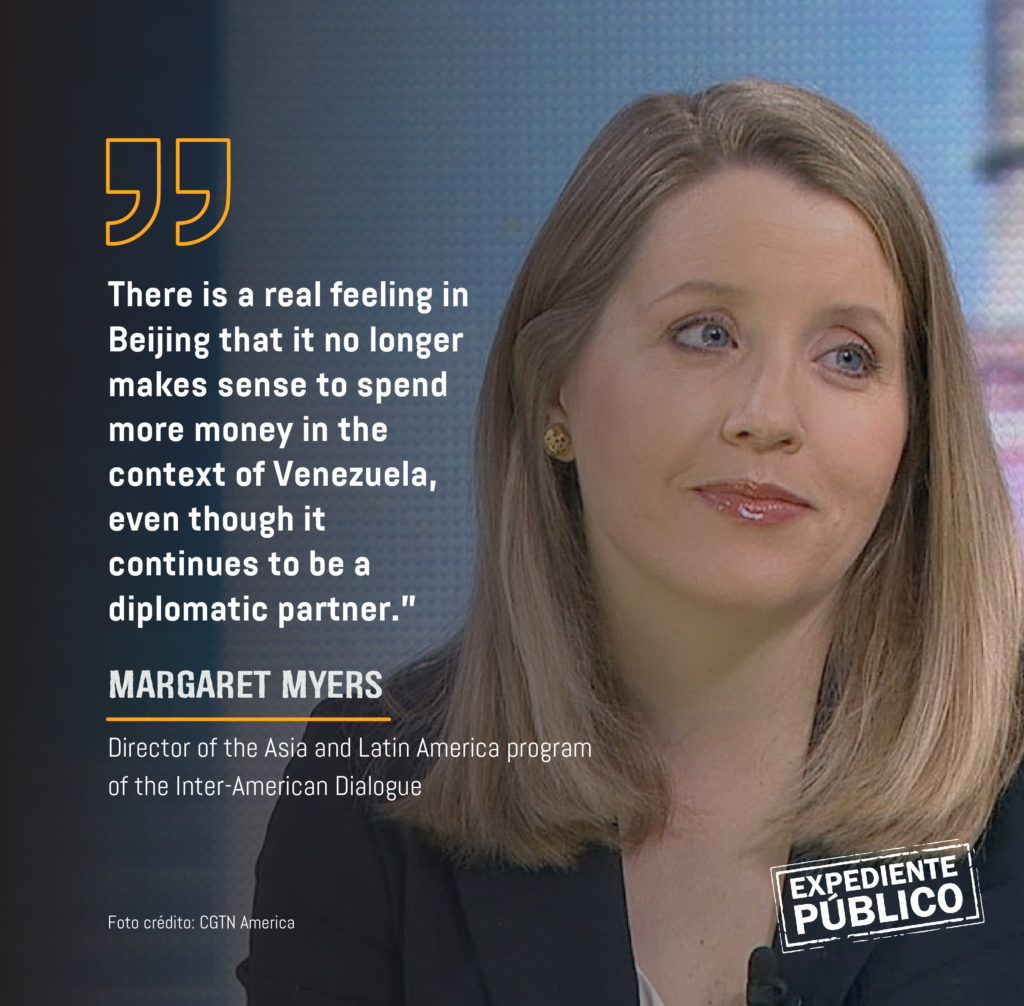
However, at this point, the regime of Xi Jinping is committed to maintaining its presence in Latin America and the Caribbean, regardless of government policies, and guaranteeing, alongside other countries, food, energy, basic supplies, and industrial security, said Myers.
This political stance is partly a consequence of the squandering of resources allocated through the China-Venezuela Joint Funds.
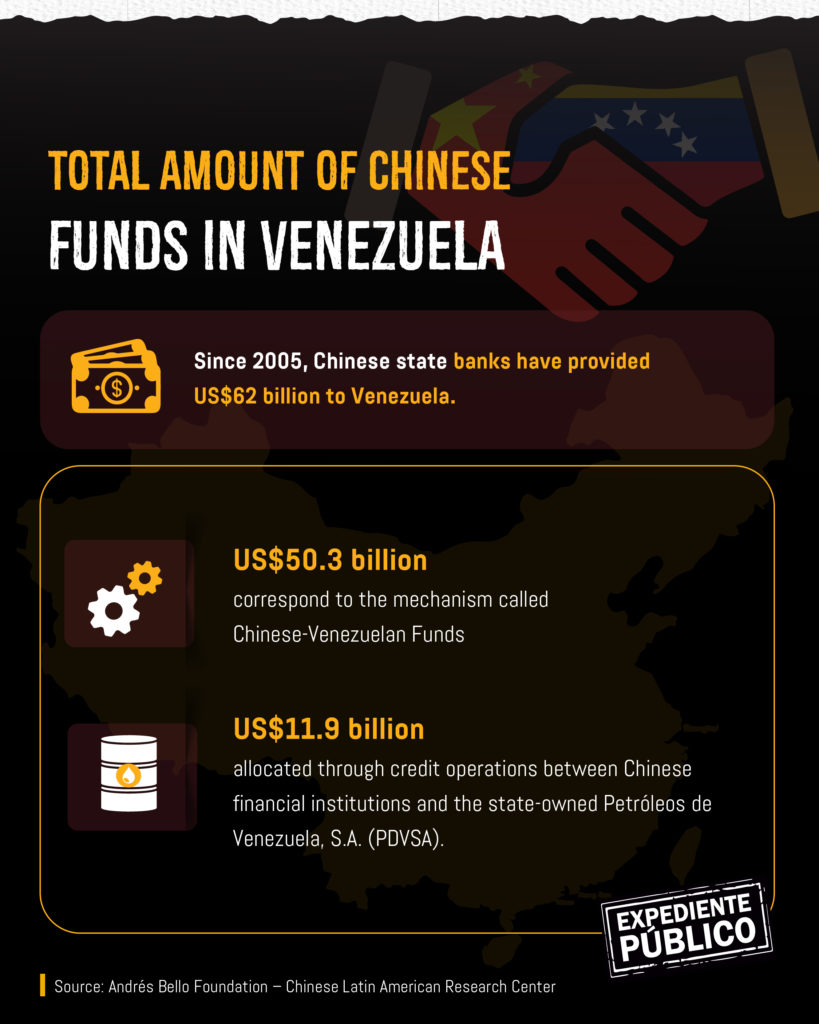
Funds kept in a “broken sack”
According to the Andrés Bello Foundation, the Funds financed 82 projects for 14 sectors of the Venezuelan economy. More than US$50.2 billion was accounted for through this scheme.
“In this regard, it has been found that 57.3% of the projects developed with financing from the Chinese funds have not concluded or have come to a complete halt,” according to research. The study indicates that “the data is relevant because it marks a trend in which almost two out of every three projects initiated by the Venezuelan government are not completed; in most of the cases of completed works, there has been a stoppage of activities.”
Context: Alianza económica con China, receta para un posible desastre
In 43 of the 82 projects, irregularities, which prevented execution according to the planning phase, were found. There were inconsistencies regarding the goals set and what was delivered, the amounts announced and the quantity disbursed, the execution and administration of the funds, and, finally, labor claims.
For the 22 cases that remained, there were suspicions of irregularities; however, the claims were never verified due to the opaque way in which the Venezuelan government handles information.
The shady handling of the China-Venezuela Joint Funds gave rise to substantial litigation and controversy. In January 2020, the Administrative Political Chamber of the Supreme Court of Justice ordered the seizure of assets of a contractor linked to the government (Valcor).
It had been found that the clauses of the contract whose purpose was to “salvage Venezuela’s production sovereignty in the aluminum industry” had not been complied with. In this case, the confiscated goods would have been worth the equivalent of US$104 million.
A bigger scandal arose from the case against former Oil Minister Rafael Ramírez and the “bolichicos” group, which includes Javier Alvarado, Diego Salazar (the insurance czar), and Luis Mariano Rodríguez Cabello.
In Spain’s extradition request for Alvarado in 2018, investigations by the executive’s own Anticorruption Unit found that the group allegedly collected bribes worth between 10% and 15% of the value of the projects with Chinese companies and financed by the fund.
The bribes, according to the sentence, ended up in accounts located in the Principality of Andorra.
“For China, Venezuela is a black sheep. It is not the best business partner,” affirmed Asdrúbal Oliveros, the director of Ecoanalítica, in an interview with Expediente Público.
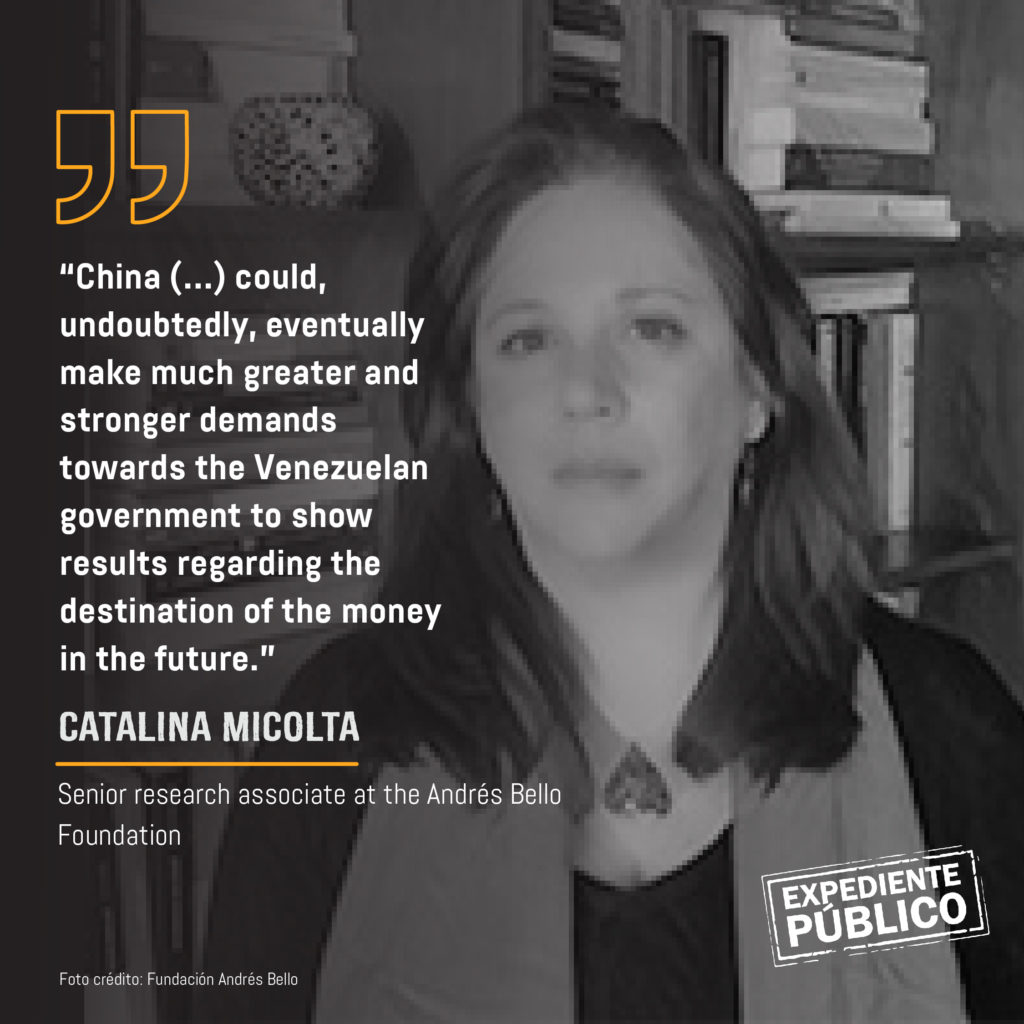
Read: Cobertura Especial: China “exporta” desinformación y autocensura al mundo libre
Oil and politics
According to Oliveros, the People’s Republic of China has not issued loans to Venezuela since 2015, but they have also not charged any fees. Even still, China continues to receive crude oil from Venezuela through the intermediaries of Singapore and Indonesia, with “discounts” that Oliveros described as “extremely high.”
Oliveros indicated that, as of 2018, the Chinese were careful not to appear on the list of countries that negotiate directly with Petróleos de Venezuela, to prevent any sanctions from the US Treasury Department.
He said that Venezuela presently owes the Chinese US$15 billion in capital, in addition to another three billion in interest.
The Chinese could capitalize on this situation regarding its goal to make the US government uncomfortable. This goal might bring them to make some concessions to the Maduro regime.
“Today, China seems more willing to buy crude oil from Venezuela directly because it has begun a new chapter of confrontation with the United States. Moreover, China is developing trade in its own currency. There is now probably a greater likelihood for this to materialize,” he said.
According to the agency Euronews, Venezuela sent China a daily average of 42 barrels of Merey oil in 2022. These operations were coordinated by the Chinese Aerospace Science and Industry Corporation (CASIC), which replaced the also state-run organization, the China National Petroleum Corporation (CNPC).
Oliveros maintains that political factors should always be considered when looking at the economic relationship between China and Venezuela.
“You cannot separate one thing from another. The Chinese are doing business, but they are also being political. They are trying to collect Venezuela’s debt. From an economic standpoint, this is excellent for the Chinese. Now, politics are also involved because they are strengthening their relationship with Venezuela, which is geographically close to the United States. The Chinese are also increasing their spheres of influence in the Americas and clearly compete with the United States, which is also negotiating with Venezuela regarding oil. That said, politics are not a separate issue,” he said.
Read: Cobertura Especial: China “exporta” desinformación y autocensura al mundo libre
A win for Miraflores
Although the economic results of the Venezuelan government’s trip to China remain to be seen, politically, the fact is that the Venezuelan regime has been able to revive its alliance with one of the world powers that has a permanent seat at the United Nations Security Council.
While China-Venezuela diplomatic relations have existed for half a century, they entered a phase that constituted a pause in 2018.
In April, however, there were signs that Beijing returned its attention to the South American country when Ambassador Lan Hu traveled from Bogotá to Caracas. The image of Xi Jinping receiving Maduro in China would also seem to mark a new chapter of relations.
“There is a renewal of relations and a clear interest by both parties to once again increase momentum in their bilateral relations,” said María Catalina Micolta, senior research associate at the Andrés Bello Foundation.
In her opinion, the withdrawal was a consequence of irregularities related to the administration of the China-Venezuela Joint Funds. The accusations of corruption also caused donors to doubt.
“For China, its experience with Venezuela, particularly regarding the Funds, left many lessons that would suggest greater caution in new ventures with the South American country. This is also why there was a pause in relations but never a formal breaking of ties,” he explained.
According to the Venezuelan Ministry of Foreign Affairs, the present projects are to be evaluated and implemented through a high-level mixed commission. However, in Micolta’s opinion, these projects will not be feasible without the effective application of verification mechanisms to reduce the risk of corruption.
“China could be more cautious and prudent as it has valuable learning experiences related to the management of the Joint Funds. The Asian country could, without a doubt, require much more of the Venezuelan government to show results regarding the destination of money in the future,” the expert warned.

